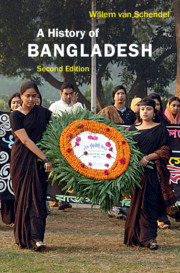Book contents
- A History of Bangladesh
- A History of Bangladesh
- Copyright page
- Contents
- Plates
- Maps and Figures
- Preface to Second Edition
- Acknowledgements
- Timeline
- Introduction
- Part I The Long View
- Part II Colonial Encounters
- Part III Becoming East Pakistan
- Part IV War and the Birth of Bangladesh
- Part V Independent Bangladesh
- Chapter 20 Shaping a Political System
- Chapter 21 The Triumph of Identity Politics
- Chapter 22 Transnational Linkages
- Chapter 23 Boom or Bust?
- Chapter 24 Gender Movements
- Chapter 25 A National Culture?
- Conclusion
- Bangladesh District Maps
- Key Political Figures since 1947
- Glossary of Bengali Terms
- Notes
- Bibliography
- Index
Chapter 22 - Transnational Linkages
from Part V - Independent Bangladesh
Published online by Cambridge University Press: 17 June 2021
- A History of Bangladesh
- A History of Bangladesh
- Copyright page
- Contents
- Plates
- Maps and Figures
- Preface to Second Edition
- Acknowledgements
- Timeline
- Introduction
- Part I The Long View
- Part II Colonial Encounters
- Part III Becoming East Pakistan
- Part IV War and the Birth of Bangladesh
- Part V Independent Bangladesh
- Chapter 20 Shaping a Political System
- Chapter 21 The Triumph of Identity Politics
- Chapter 22 Transnational Linkages
- Chapter 23 Boom or Bust?
- Chapter 24 Gender Movements
- Chapter 25 A National Culture?
- Conclusion
- Bangladesh District Maps
- Key Political Figures since 1947
- Glossary of Bengali Terms
- Notes
- Bibliography
- Index
Summary
Bangladesh’s elite had been decimated twice within a generation. In 1947 many upper-class, professional and entrepreneurial Hindus had left for India and they had been largely replaced by newcomers from West Pakistan. In 1971 these newcomers retreated to Pakistan amidst targeted killings of the delta’s professionals and intellectuals. As a result, independent Bangladesh started out with only a few people who had any experience in running state institutions or large enterprises. They needed all the help they could get.Suddenly they had to perform on the global stage. As a result, Bangladesh society rapidly developed new transnational links that would shape its future course. Especially influential were foreign aid and investment, mass migration and rapid advances in connectivity.
- Type
- Chapter
- Information
- A History of Bangladesh , pp. 256 - 274Publisher: Cambridge University PressPrint publication year: 2020

